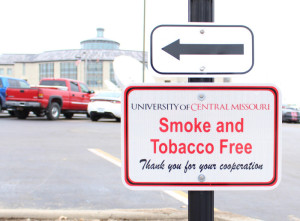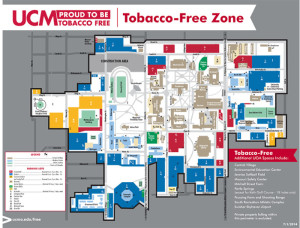By STEVEN SPEARS
Muleskinner News Editor
Editor’s note: This is the first of a two-part series on UCM’s Use of Tobacco Policy.
Tobacco users at UCM now have an option to get their fix on campus.
Effective immediately, the university’s Use of Tobacco Policy will allow the use of tobacco products on sidewalks adjacent to named city streets.
 The policy, which went into effect Jan. 1, 2014, originally banned the use of all tobacco products on UCM property. Exceptions were written into the original policy to permit the use of tobacco on the Keth Memorial Golf Course, in personal vehicles, and in designated parking lots during special events such as commencement, sporting or performing arts events.
The policy, which went into effect Jan. 1, 2014, originally banned the use of all tobacco products on UCM property. Exceptions were written into the original policy to permit the use of tobacco on the Keth Memorial Golf Course, in personal vehicles, and in designated parking lots during special events such as commencement, sporting or performing arts events.
President Chuck Ambrose decided to update the policy Jan. 8 after meeting with representatives from the Tobacco Policy Procedures Committee and the Office of Legal Affairs and Risk Management.
“I actually think this is a good development,” said Amy Kiger, director of Violence and Substance Abuse Prevention. “We don’t want a policy that goes against other city policies or other ordinances. I also think it’s going to help with compliance because it’s much easier to ask someone to walk to a sidewalk that abuts a street than it is to say, ‘Can you please go to your car? Can you please go off campus?’”
Kiger said numerous students continued to use tobacco products on campus despite it being against university regulations.
 Kiger said she approached two students who were smoking on campus to inform them of the smoking ban. She said the students expressed concerns that the policy was unlawful. They viewed campus sidewalks as public right of ways, not university property, and – as a public thoroughfare – they felt campus sidewalks are not subject to university policy.
Kiger said she approached two students who were smoking on campus to inform them of the smoking ban. She said the students expressed concerns that the policy was unlawful. They viewed campus sidewalks as public right of ways, not university property, and – as a public thoroughfare – they felt campus sidewalks are not subject to university policy.
Kiger said she brought the matter to the attention of UCM’s Tobacco Policy Procedures Committee, which posed the question to the Office of Legal Affairs and Risk Management.
Shelly Gonzalez, policy director for the Office of Legal Affairs and Risk Management, said she began researching the legal definition of public right of way when the issue was brought to her attention in early November 2014.
“When we went to research it, it was difficult because there’s not a lot of law out there right now regarding use of tobacco,” Gonzalez said. “So I looked a little more at free speech and what can be controlled and not controlled. That helped get us to the right of way, and defining it, because there wasn’t a clear definition even by the state of Missouri on right of way. So I had to do a bit of digging.”
Gonzalez said her recommendation to update the policy came after an extensive look at city ordinances and Missouri common law, and by looking at how other universities addressed public right of way.
“Any sidewalk that abuts a public street – a public-named street – those have a right of way for public use,” Gonzalez said. “If they do not abut a city street, then you may not smoke on those sidewalks. If they are controlled by – not maintained, but controlled by – the university, and the boundaries are not on a city-named street, then those sidewalks, that are the university’s, you will not be allowed to smoke there.”
Gonzalez compared the policy update to having a sidewalk in front of a private residence. Even though it is built on private property, and the owner of the residence may have to maintain it, the sidewalk is still controlled by the city and is considered a public walkway.
Since the policy was implemented, littering on campus has become an issue. Campus ashtrays were removed after the policy went into effect, prompting smokers to discard cigarette butts on the ground.
In order to reduce the amount of tobacco-related waste around campus, VSAP will begin offering tin containers to individuals taking advantage of the new Public Right of Way policy exception. The containers will give smokers a way to temporarily store their cigarette butts, until they find a means of proper disposal.
“Tobacco is very addictive and so, yes, (the policy) is difficult to people who have smoked for a long time and are addicted,” Kiger said. “It is a change that’s difficult, and so that’s why we’re trying to be kind whenever we’re educating about the policy, provide cessation resources if they want, give these (containers) out to people who are using tobacco so they don’t feel like they have to make a choice to litter or not litter. We’re really trying to be respectful.”
Kiger said VSAP would begin distributing the containers on campus beginning the week of Jan. 17 and said she hopes providing smokers with a tool to store their waste will help lessen the number of discarded cigarette butts.
“People have to self-enforce it,” Kiger said. “Part of the reason we didn’t do it is because it’s just not realistic to think that we’re going to be able to write tickets or something like that. It’s just not realistic to think that we’re going to be able to do that. We already have a method in place that if there are people who are being disruptive to others and causing problems, then we already have a system in place that can be used to address that. We didn’t really need to create a different system.”
There are 1,514 colleges and universities nationwide that have implemented 100 percent smoke-free policies, according to the American Nonsmokers’ Rights Foundation. Of these institutions, 1,014 are tobacco-free and 587 have prohibited the use of e-cigarettes on school grounds.
The University of Missouri – Kansas City, the University of Missouri – Columbia and Missouri State University have adopted some level of tobacco prohibition, with UMKC being the only one to address public right of way.
“We utilize the policies in place for students pertaining to alcohol use or other substance use in that they are referred to the dean of students,” said Sheila Bowen, employee wellness coordinator at MSU. “This is usually after two recommendations from security to stop smoking on campus. To date, we have only had one student have to visit the dean of students office in the last two years to my knowledge.”
Kiger said UCM’s Use of Tobacco Policy is a work in progress.
“So we’ll address issues as we can as they come up, and then we’ll have to come up with something new because this is not going to solve every problem,” she said. “I have found most individuals who are using tobacco to be very conscientious and to want to comply with the policy.”
PHOTO BY MEGAN RYBA / PHOTO EDITOR This month marks the anniversary of UCM’s tobacco-free policy.
Categories:
Sidewalk smokers rejoice: UCM updates tobacco policy
Written by Muleskinner Staff
January 16, 2015
0
Tags:






